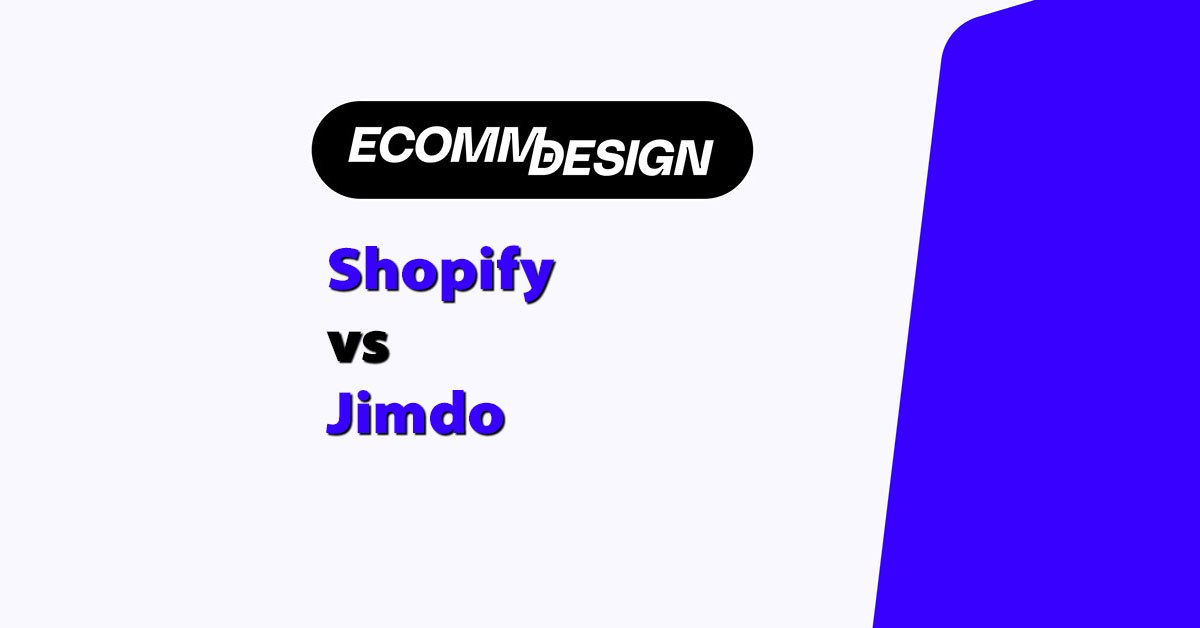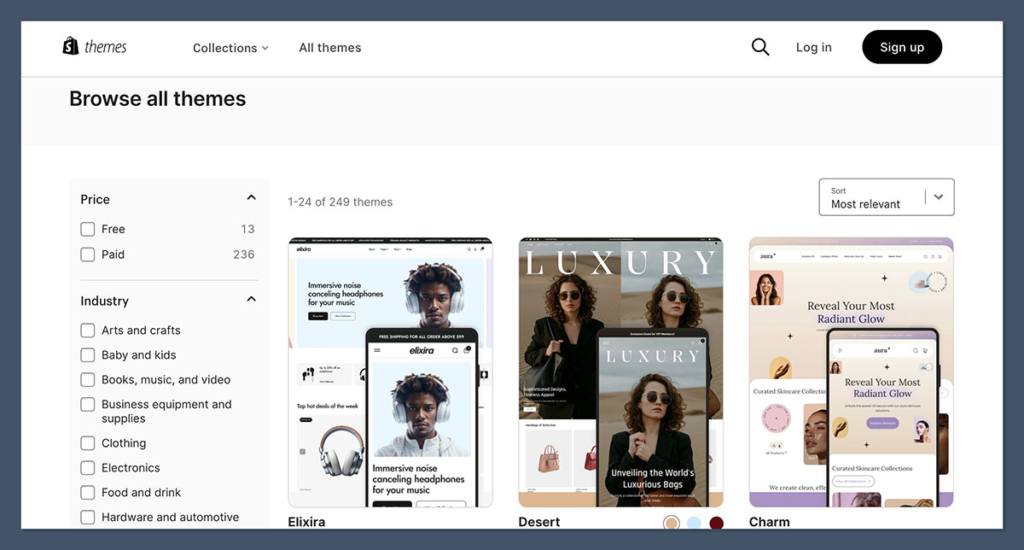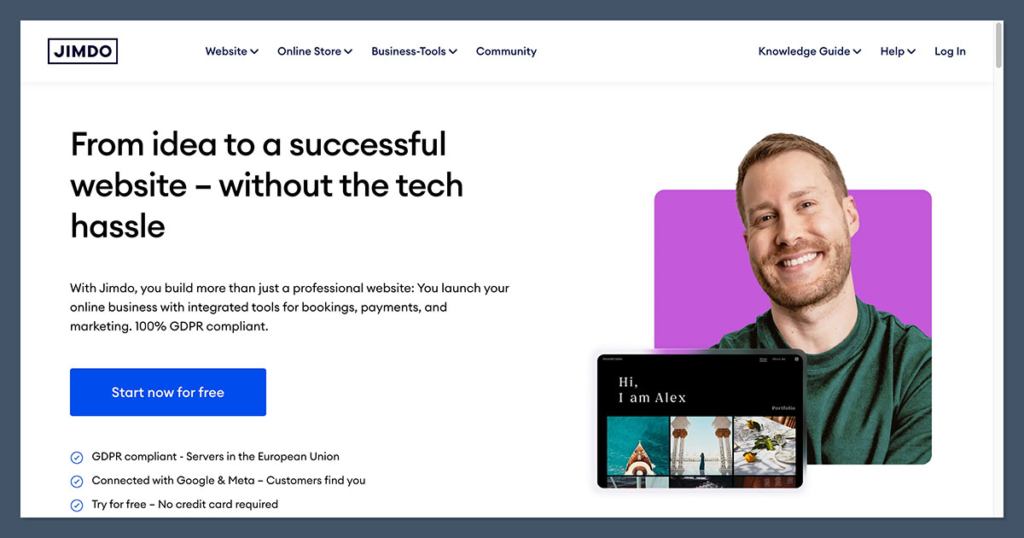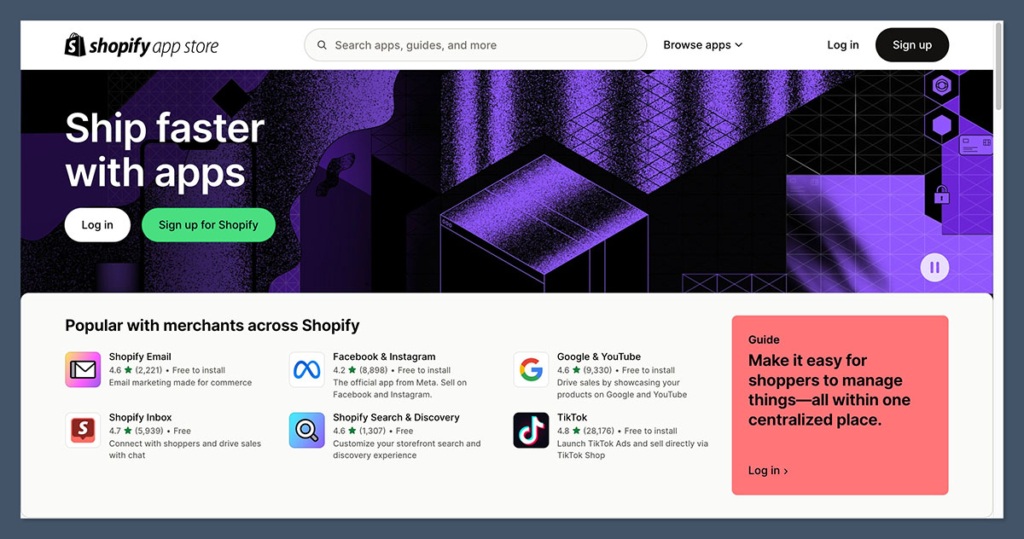
Shopify and Jimdo are two ecommerce website builders aimed at helping businesses sell online — but they’re built for different types of users.
Shopify is one of the biggest names in ecommerce, known for its scalability and professional tools, while Jimdo focuses on simplicity and speed, targeting beginners and small shop owners.
To find out which one performs best, I spent time testing and reviewing each platform, examining everything from pricing to design features, SEO tools, and app integrations.
The result? Shopify is clearly the stronger choice if you’re building an ecommerce store with growth in mind.
Shopify vs Jimdo: Quick Verdict
- Shopify – Best overall for building, growing, and managing a professional online store
- Jimdo – Best for solo creators or beginners launching a simple online presence
In this comparison, I’ll walk you through key differences between the two, including sales features, pricing, ease of use, templates, SEO, and more — so you can decide which platform best suits your ecommerce goals.
Quick Comparison: Shopify vs Jimdo
Get a fast overview of how Shopify and Jimdo stack up across core ecommerce categories:
| Feature | Shopify | Jimdo |
|---|---|---|
| Best For | Growing ecommerce brands | Simple sites and hobby shops |
| Pricing | From $29/month | From $9/month |
| Free Trial | 3 days | 5 days |
| Ease of Use | Moderate | Very Easy |
| Design Options | Extensive, customizable | Basic, limited flexibility |
| Ecommerce Features | Advanced | Basic |
| Apps & Integrations | 8,000+ | Very limited |
| Support | 24/7 live chat + help center | Email + basic help center |
Best for Pricing: Jimdo for Simplicity, Shopify for Value
If you’re looking at monthly pricing alone, Jimdo is clearly cheaper.
But when you look at what you’re getting for the money, Shopify starts to pull ahead.
Shopify Pricing Plans:
| Plan | Price (billed monthly) |
|---|---|
| Basic | $29/month |
| Grow | $79/month |
| Advanced | $299/month |
Basic – $29/month
This plan includes everything you need to start selling online, including unlimited products, two staff accounts, and access to key sales features like discount codes and abandoned cart recovery. It’s a great entry point for new businesses looking to get off the ground.
Grow – $79/month
Aimed at growing businesses, this plan adds professional reporting, five staff accounts, and better shipping discounts. It’s ideal if you’re scaling and need more tools to manage your team and track performance.
Advanced – $299/month
Built for high-volume stores, the Advanced plan offers custom reporting, up to 15 staff accounts, and the lowest transaction fees. It’s best for established businesses that need deeper analytics and advanced shipping tools.
Shopify also offers a 3-day free trial, and for a limited time, your first three months are just $1/month on any paid plan.
Shopify charges transaction fees unless you use Shopify Payments, but you gain access to top-tier ecommerce features at every level.
Jimdo Pricing Plans:
| Plan | Price (billed monthly) |
|---|---|
| Start | $9/month |
| Grow | $15/month |
| Unlimited | $39/month |
Start – $9/month
This entry-level plan includes a custom domain, basic website features, and the ability to sell up to 5 products. It’s suitable for personal projects or very small stores with minimal inventory.
Grow – $15/month
With support for up to 100 products, SEO tools, and site analytics, this plan is better suited for small businesses looking for a bit more flexibility. It also includes email support and faster load times.
Unlimited – $39/month
This plan removes product limits and unlocks priority support, faster website performance, and advanced analytics. It’s designed for users who want more freedom and scalability without switching platforms.
Jimdo is great if your budget is limited. There’s no transaction fee and fewer overall costs.
But that lower price comes with a trade-off: fewer features, less control, and limited ability to grow.
The Winner: It Depends on Your Needs
Jimdo is better for tight budgets and simple stores. Shopify delivers far more functionality, but you’ll pay for it.
Best for Selling Online: Shopify

If your priority is building a powerful online store that scales, Shopify wins — hands down.
Jimdo lets you sell online, but it’s not nearly as feature-rich or flexible.
Shopify’s Standout Sales Features
- Sell unlimited products with variants (color, size, etc.)
- Sell on multiple channels like Facebook, Instagram, Amazon, TikTok
- Abandoned cart recovery
- Shopify POS for in-person sales
- Discount engine and gift cards
- Subscriptions and digital products via apps
- Real-time inventory sync
- International selling with multiple currencies and languages
Shopify’s Shop Pay checkout is fast and optimised for conversions, and Shopify Magic (AI tool) helps create product descriptions quickly — a big time-saver.
Jimdo’s Sales Features
- Sell physical and digital products
- Simple checkout (Stripe, PayPal)
- Basic tax and shipping setup
- Basic inventory tracking
- Digital product delivery
- No multi-channel selling
- No native POS integration
Jimdo offers enough for a starter store or side project, but lacks more advanced functionality.
The Winner: Shopify
For any serious ecommerce store, Shopify is the better choice with features designed to support growth, automation, and multichannel selling.
Best Templates and Design Tools: Shopify

Design plays a huge role in building customer trust and boosting conversions. Shopify clearly provides more variety and flexibility than Jimdo.
Shopify Themes
- 13 free templates
- 180+ paid templates ($100–$500 one-time fee)
- Themes tailored by industry (fashion, electronics, beauty, etc.)
- All themes are mobile-responsive and SEO-ready
- Easily customizable through the drag-and-drop editor
- Deep access to theme code (HTML, CSS, Liquid)
I liked how I could switch themes without losing content, and customize nearly every section of the store — from homepage to checkout.
Jimdo Templates
- Limited theme selection (around 40 options)
- All are mobile responsive and beginner-friendly
- Basic layout customization
- Little flexibility for advanced design or unique branding
- No access to theme code unless you pay for the top-tier plan
Jimdo’s designs are clean and simple, but they all start to feel the same after a while.
The Winner: Shopify
Shopify gives you control, customizability, and variety — ideal for building a brand that stands out.
Best for Ease of Use: Jimdo

Shopify offers a streamlined backend and a helpful setup checklist, but Jimdo is easier for total beginners.
Jimdo Setup Experience
- AI-driven builder creates your site in minutes
- Minimal setup questions
- Very clean dashboard with clear navigation
- No coding or design skills required
Perfect if you just want to get a basic site up quickly with zero friction.
Shopify Setup Experience
- Quick onboarding flow that asks about your business goals
- 13-step checklist to walk you through product setup, design, and launch
- Intuitive drag-and-drop editor
- Deep functionality can feel overwhelming at first
If you’ve used other builders like Wix or Squarespace, Shopify will feel familiar. But compared to Jimdo, it has more features and setup steps.
The Winner: Jimdo
If you want the fastest, simplest way to launch a store, Jimdo is the easier option. Shopify isn’t hard, but it does require more setup time.
Best for SEO and Marketing: Shopify
Driving traffic to your store means getting serious about SEO, email marketing, and social commerce. Shopify has more tools and integrations to support these needs.
Shopify’s Marketing Tools
- Shopify Email for simple campaign creation
- Product tagging and automatic social sharing
- Shopify Marketplace Connect app (Amazon, Etsy, eBay)
- Built-in blog for content marketing
- SEO fields for every page, image, and product
- Integration with Semrush via the Ecommerce Booster app
Shopify brings these tools together in a way that makes it easy to run consistent, channel-wide promotion from a single dashboard.
Whether you’re sending campaigns, publishing content, or syncing products to marketplaces, everything feels integrated and built to help you increase visibility and sales.
Jimdo’s Marketing Tools
- Basic newsletter signup form
- Social media icons for linking out
- SEO settings for pages and images
- No built-in blogging platform
- No app marketplace for marketing integrations
Jimdo covers the basics but lacks any serious marketing tools out of the box.
The Winner: Shopify
Shopify’s built-in tools and expansive app ecosystem make it much easier to grow traffic, build a list, and sell across channels.
Best for International Selling: Shopify
If you want to sell to customers worldwide, Shopify is more equipped to support that.
Shopify’s Global Features
- Sell in multiple currencies
- Translate your store into over 30 languages
- International shipping setup and tax automation
- Redirects customers based on location/language
- Shopify Markets to manage global regions
These global features make it easy to run a store that feels local to international customers, no matter where they’re browsing from.
Shopify handles the complexity of currencies, languages, and regulations behind the scenes so you can focus on growing your brand worldwide.
Jimdo’s Global Features
- Supports multiple languages
- Basic shipping zones
- No multi-currency support
- No international tax automation
Jimdo covers basic international needs but lacks advanced features. It’s fine for local selling with a multilingual site, but not ideal for managing global transactions.
The Winner: Shopify
Shopify’s international selling features are more complete and user-friendly, especially if you plan to expand your reach.
Best App Store and Add-Ons: Shopify

The ability to customize and expand your store through apps is a huge advantage. Shopify outclasses Jimdo here by a wide margin.
Shopify App Store
- Over 8,000 apps
- Categories include shipping, upsells, reviews, analytics, loyalty programs, and more
- Free and paid options
- Native app integrations with Klaviyo, Omnisend, ShipStation, etc.
With thousands of apps available, Shopify makes it easy to extend your store’s functionality as your business grows.
Whether you need marketing tools, automation, or advanced analytics, there’s likely an app ready to plug in.
Jimdo App Ecosystem
- No official app store
- Only a handful of third-party integrations
- Limited to built-in features
Jimdo keeps things simple by sticking to built-in features, but this limits your ability to scale or customize.
Without an app store, you’ll quickly hit a ceiling if your store needs more advanced tools.
The Winner: Shopify
Shopify’s app ecosystem allows you to customize your store endlessly. Jimdo’s lack of integrations puts a cap on what your site can do.
Best for Customer Support: Shopify
Support can make or break your experience. Shopify leads with 24/7 options and a large help ecosystem.
Shopify Support
- 24/7 live chat and help center
- Phone support for Shopify Plus users
- Detailed documentation, video tutorials, and forums
- Large community of developers and freelancers
Shopify provides responsive, around-the-clock support with plenty of resources to troubleshoot or learn on your own. Whether you’re a beginner or scaling fast, it’s easy to find help when you need it.
Jimdo Support
- Email-based support
- Limited chat availability
- Smaller help center with fewer tutorials
- Slower response times reported by users
Jimdo offers basic support channels, but help is slower and less comprehensive. It’s serviceable for small sites, but may fall short if you run into complex issues.
The Winner: Shopify
Shopify’s support is more responsive, comprehensive, and available around the clock.
Final Verdict: Shopify Wins for Serious Sellers
| Feature | Winner |
|---|---|
| Pricing | Jimdo |
| Ecommerce Features | Shopify |
| Templates | Shopify |
| Ease of Use | Jimdo |
| SEO & Marketing | Shopify |
| Global Selling | Shopify |
| App Store | Shopify |
| Customer Support | Shopify |
Overall Winner: Shopify
If you’re starting a hobby store or personal project, Jimdo is the easier, cheaper way to get online.
But if you’re planning to scale a brand, manage products professionally, and sell across multiple channels, Shopify is the better investment.
Both platforms offer free trials, so my advice is to test both and see which one fits your needs — but for most ecommerce sellers, Shopify offers more flexibility, tools, and long-term value.



